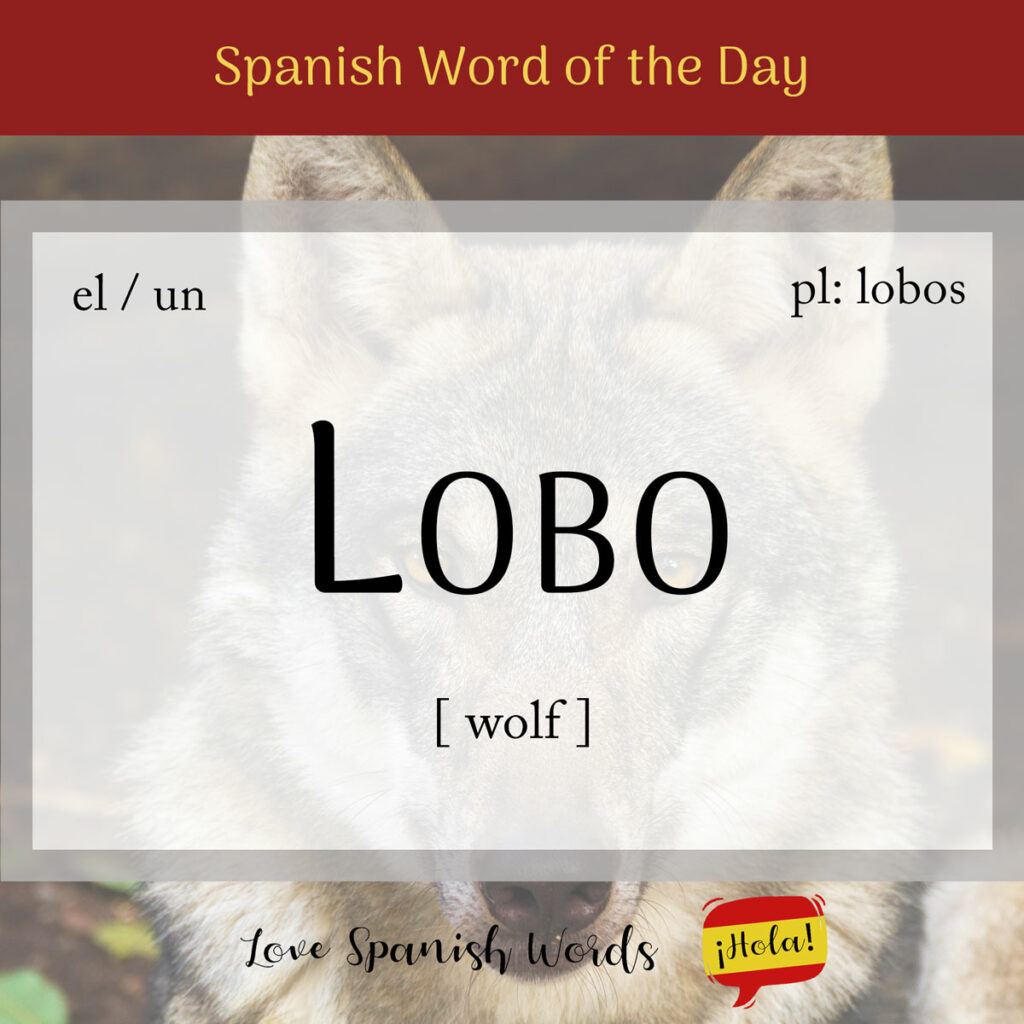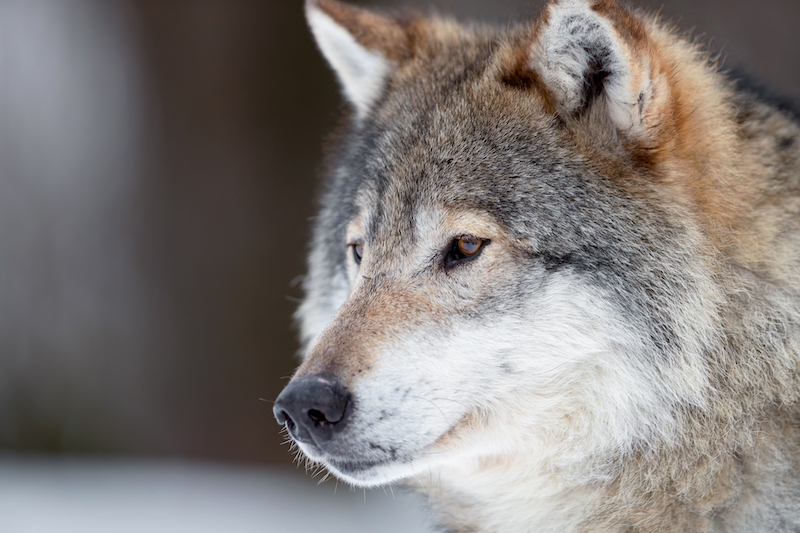The word lobo (wolf) originates from the Latin word lupus which also means wolf. These carnivorous mammals are from the (familia canina) canine family, which are similar to dogs but bigger. Their scientific name is Canis lupus.
Latin American Pronunciation
European Pronunciation

Lobo is a masculine noun, but when speaking about the wolf, you can use the feminine noun loba if you know its gender. Below are the definite and indefinite articles for the word:
Masculine Version
- el lobo = the wolf
- los lobos = the wolves
- un lobo = a wolf
- unos lobos = some wolves
Feminine Version
- la loba = the wolf
- las lobas = the wolves
- una loba = a wolf
- unas lobas = some wolves
Lobos live in various regions around the world, specifically North America, Europe, Asia, and the Middle East. They prefer living in bosques (forests), tundras (tundras), and montañas (mountains). Yet they easily adapt and can live in hot desiertos (deserts) too.
Lobos are known as social animals that live in manadas (packs). They have a great sense of olfato (smell) that helps them when hunting and they are opportunists who aren’t picky when eating.
Their diet depends on where they live, but some of their preferred food includes ciervos (deer), bisontes (bisons), alces (elk), renos (reindeer), cabras montesas (mountain goats), and pecaríes (peccaries). Smaller animals they hunt are liebres (hares), conejos (rabbits), roedores (rodents), castores (beavers), and peces (fish). Sometimes they even eat frutas (fruits).
El lobo cazó un bisonte con su manada.
The wolf hunted a bison with its pack.
Lobos are known for their famous aullidos (howls). They do this to communicate with their pack members, to find each other, and to mark their territory. Family is important to lobos, so they stick together in packs of about 6-11 members. However, they can live in larger groups too.
Each wolf in the pack has a role, starting with the leaders who make the important decisions, the pareja alfa (alpha pair). Next in the jerarquía (hierarchy) are the betas (betas) who help the alphas. After that are the middle-range wolves, and last in the hierarchy are the omegas (omegas) who help reduce tension and foster unity in the packs. The cachorros (cubs) are protected by all the adult wolves in the pack.
Los lobos aullaron toda la noche durante la luna llena.
The wolves howled all night during the full moon.
Lobos are animals that carry a lot of symbolism for humans. In some cultures, the wolf is seen as feroz (fierce), leal (loyal), and inteligentes (intelligent). They are often associated with liberty.
They show up in many mythologies and cuentos y cuentos de hadas (stories and fairytales). One popular story is Caperucita Roja (Little Red Riding Hood) where the wolf is represented as dangerous and malicious. Many stories perceive the lobo this way, including as an independent animal that enjoys solitude.
We see these characteristics when speaking about the hombre lobo (werewolf), the mythological creature that transforms into a wolf during a luna llena (full moon).

Fun Fact: The origin of the hombre lobo legend traces back to Greek mythology. The god Zeus turned a man named King Lycaon into a werewolf as punishment for trying to trick him.
This early reference to a werewolf in this myth gave rise to the term licantropía (lycanthropy) which is used to describe the supernatural transformation of a human into a wolf.
When referring to women, ser loba (to be a female wolf) represents many things. One reference is to a woman being sexually attractive, being a prostitute, or someone who easily fulfills a man’s desires.
It can also refer to women who are feroz (fierce), espíritus salvajes (wild spirits), poderosas (powerful), and espontáneas (spontaneous) like a loba. They know how to protect themselves from predators and are experienced. A popular pop song called Loba by Shakira (also in English as She Wolf), represents what it means to be a loba.
The idiom Llevar una loba por dentro (to have a female wolf inside of you) is used in femenismo (feminism) to represent a woman who is a leader and knows how to guide and look after her loved ones and take care of herself. It also refers to being a strong and wise woman.
Mi mamá es una loba feroz cuando se trata de proteger a sus hijos.
My mom is a big bad wolf when it comes to protecting her children.
If we use the masculine version, ser lobo (to be a wolf), it usually carries a negative meaning. You can refer to someone as a lobo if they are aggressive, rude, and don’t show mercy. This isn’t gender specific – you can call a woman a lobo or loba too using this meaning.
A lobo can also be a man who attempts sexual intimacy with women he knows, a person who looks for solutions and has sympathy towards others, a person who is independent and emotionally smart, an opportunist who seeks any chance to come across as superior, or a person who is a free spirit.
The movie starring Leonardo DiCaprio, El Lobo de Wall Street (The Wolf of Wall Street), depicts what it means to be a lobo with no ethics in the pursuit of getting rich.

Spanish sayings featuring ‘lobo’
Cría lobos y te devorarán translates to Raise wolves and they will devour you. This saying refers to the idea that those you nurture may grow up to be ungrateful despite everything you have done for them.
Aullando con lobos, se aprende a aullar translates to Howling with wolves, you learn to howl. This phrase means that the people you surround yourself with will shape what you learn from them, for better or worse. You might say this to someone as a caution to choose their friends wisely, as those friends can influence their habits, choices, and lifestyle.
Spanish idiomatic expressions featuring ‘lobo’
Ser lobo solitario
Literal translation: to be a lone wolf
English meaning: to be a person who prefers to act alone, without the company or help of others
Aullar como un lobo
Literal translation: to howl like a wolf
English meaning: to yell or lament intensely
Ser lobo con piel de cordero
Literal translation: to be a wolf with lambskin
English meaning: to be a person who appears inoffensive or kind, but in reality, is dangerous and ill-intentioned, to be a wolf in sheep’s clothing
Verle las orejas al lobo
Literal translation: to see the wolf’s ears
English meaning: to recognise danger or problems immediately

